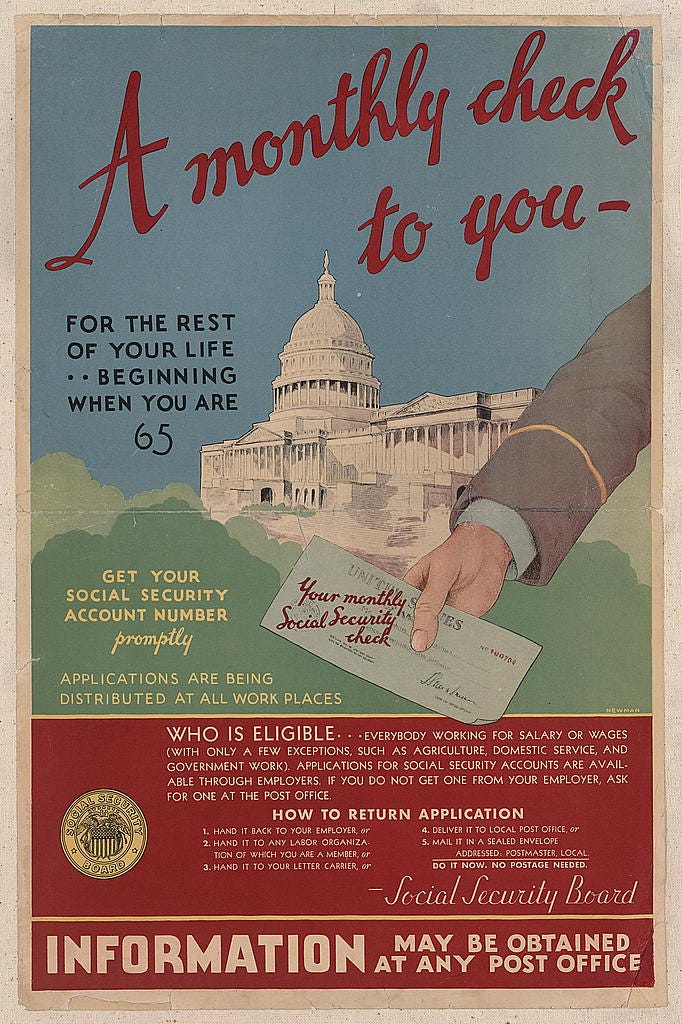TL(PM) DIGEST: Social Security—still popular after all these years
Plus a Tennessee legislature meltdown, how Biden's empowering local government, and the climate change's effects on America's pastime

1. Americans of all ages oppose Social Security benefit cuts and eligibility hikes
What happened? A new poll from AP/NORC shows strong majorities of Americans both over and under the age of 45 opposing steps to reduce the size of Social Security benefits and to raise the eligibility age to 70.
Why does it matter? Although younger people tend to lack confidence in the long-term viability of Social Security—60 percent of Americans under 45 in this poll say they are not confident about its future—they also oppose two main ideas for changing it. Seventy percent of those under 45 oppose benefit cuts and three quarters oppose raising the Social Security eligibility age to 70.
TLP’s take: Since it’s a universal social insurance program, Social Security enjoys overwhelming public backing like no other program. Rather than mess around with unpopular benefit reductions and stricter eligibility requirements, Congress should consider a simple and effective step to help improve Social Security’s financing: raise or eliminate the cap on payroll taxes for those with higher incomes.
2. Tennessee legislature expels two legislators for protesting
What happened? Republican supermajorities in the Tennessee legislature expelled two Democratic members for participating in protests inside the Capitol over the issue of gun control.
Why does it matter? The protests by the two Democrats, along with a third who was not expelled, were certainly annoying and against protocol of the Tennessee legislature. Some sort of censure for rules violations would be warranted, but according to The Washington Post this escalation appears to be without precedent:
The Tennessee House had only expelled members three times previously, according to a report from the office of the state’s attorney general. In 1866, six members were expelled “for the contempt of the authority of this House.” In 1980, a member was expelled for seeking a bribe in exchange for tanking a piece of legislation. And in 2016, a representative was expelled amid state and federal investigations of sexual misconduct.
TLP’s take: Expelling two elected legislators of the opposite party for non-violent protest—however inappropriate in a legislative context—is pure sectarian politics by Tennessee Republicans, not expeditious rule enforcement. This is America—legislators are supposed to speak their mind regardless of the sensitivities of the opposition party. Just ask Rep. Marjorie Taylor Greene (R-GA), who loves yelling at President Biden from the floor of the U.S. Congress.
3. How Biden’s signature policies bypassed states and gave local governments more sway
What happened? Washington Monthly editor Will Norris outlines the ways in which the Biden administration has used its signature initiatives—especially the Bipartisan Infrastructure Law—to circumvent recalcitrant, often Republican-controlled state governments and empower local governments by allowing them to apply directly for competitive federal project grants.
Why does it matter? Since the late 2000s, Republican-controlled state governments in places like Ohio, Florida, and Wisconsin routinely turned down federal money for infrastructure projects and other programs against the wishes of local governments in their states. The Biden administration’s approach has allowed local communities seek out federal funds for projects directly—and address “basics like clean drinking water, broadband access, and crumbling infrastructure” that have broad support across party lines.
TLP’s take: It’s good that the Biden administration has found ways to engage with local government and make sure grandstanding state politicians don’t sabotage national economic development priorities or neglect the needs of local communities, whether urban or rural, in their own states. That’s the sort of creative policymaking the country needs at a time of extreme partisan polarization.
4. Too many dingers? Climate change may be partly to blame
What happened? The Washington Post’s Capital Weather Gang highlights new research in the Bulletin of the American Meteorological Society that suggests climate change may have played a role in the increased numbers of home runs hit by Major League Baseball players in recent decades. The researchers estimate that climate change can account for more than 500 additional home runs hit since 2010, and more home runs will likely attributable to climate change in future seasons.
Why does it matter? Climate change even affects America’s pastime, increasing the prevalence of home runs in recent years and decades. But like the effects of climate change on natural disasters, these changes—while important and noticeable—occur largely at the margins. The 2010s-era surge in home runs, for instance, was at least partly attributed to changes in the way baseballs were made—changes the league successfully rectified with a “deadened” ball in the 2022 season.
TLP’s take: As if America didn’t need another reason to tackle the serious—but not apocalyptic—challenge of climate change, protecting our national pastime gives us another. All the more reason to get on with permitting reform so the promise of the Biden administration’s investments in clean, carbon-free energy can be fully realized.
Just one more thing…
They got high in the Bronze Age, too: strands of human hair dating back 3,000 years found on Minorca and analyzed by scientists tested positive for hallucinogenic substances, suggesting “a proclivity for consuming psychoactive drugs” as part of religious or spiritual rituals.






